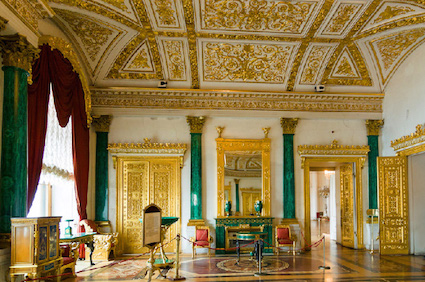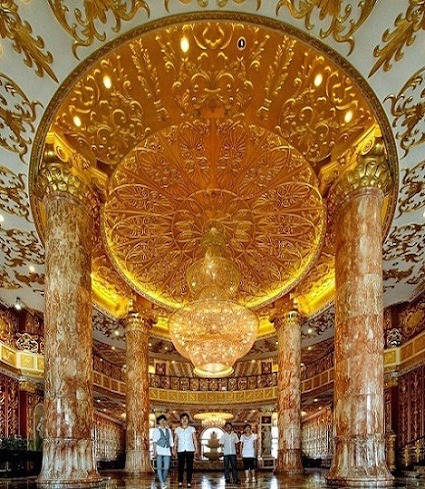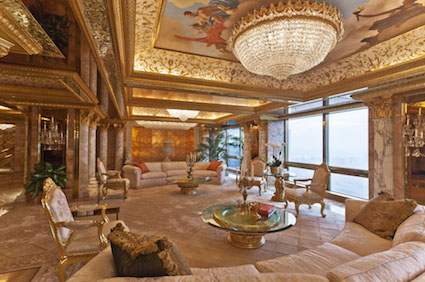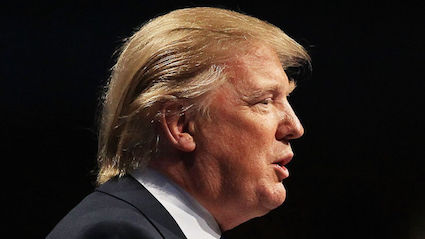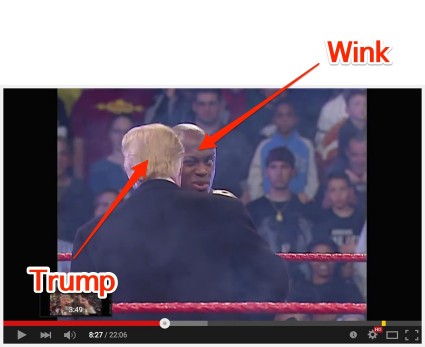By Lambert Strether of Corrente.
Everything that accumulates must converge, as Flannery O’Connor did not quite say, and there is a certain style that all avatars of wretched excess tend to share. For example, here is the Malachite Hall in the Czar’s Winter Palace in St. Peterburg:
And here is Marie Antoinette’s bedchamber at Versailles:
And here is the Harbin Pharmaceutical Group in China:
And here is Donald and Melania Trump’s Manhattan apartment:
As you can see, the architecture of wretched excess is elaborate, in poor taste, deeply fake, gold, and — like so much else imperial excess — not long for this world.
Elaborate, in poor taste, deeply fake, gold… Rather like Donald Trump’s comb-over[1]:
But if Trump, in his person, is a symbol of wretched excess, what is the nature of that excess? And is it long for this world?
Now, we live in an amazing and delightful world where Donald Trump is running for President, and — the Republican base having given a magnificently upraised middle finger to their establishment — is leading in the polls at 17%, ahead of Jebbie (14%), Walker (8%), Cruz (6%), and Rubio (5%), among others. (Numbers do not add due to the incredible number of also-rans with tiny little pockets of support.) I’m not going to be covering the Democratic yammering about Trump’s comments on Mexicans, because the Democrats, after doing squat about the foreclosure crisis, which disportionately affected blacks, or about permanently high disemployment, ditto, have nothing to say about racism. (Obama’s speeches, belated pardons, and prison visits are mere tokens that don’t make up for the real material damage he inflicted as the more effective evil.) Instead, I’ll quickly look at Trump the campaigner and Trump the Businessman, before I move on to the Trump I consider the most interesting: Trump the Kayfabe Master. (I also believe that kayfabe, which one modification that I’ll describe, is a useful metaphor for American politics; hence my focus on it.) There is, of course, an immense literature on Trump, because he’s in in the business of generating it; so I can only touch on a few points (and let’s just forget about the issues. Philip Bump tries that here, and he has a harder time than I had with Clinton.)
Trump the Campaigner
He’s running a real campaign (for some definition of real). Business Insider:
He’s got seven full-time staffers in New Hampshire, a sprawling office space in Manchester with walls displaying Trump photos and quotations, and a schedule that’s put him in front of hundreds of voters in the first primary state. As well: nine people working for him in Iowa, six in South Carolina, 15 people based in New York City, a number of policy consultants, a treasurer and a lawyer who specializes in ballot access issues. He’ll be back in New Hampshire for a rally Thursday.
And Trump loaned his own campaign $1.8 million.
He’s sucking all the oxygen out of the room for second-tier candidates. The Hill:
Candidates such as Huckabee desperately need media attention if they are to ascend to the top tier of candidates alongside Bush, Walker and Rubio. And that is less likely, experts say, as long as Trump commands center stage.
“News resources are allocated to where news is likely to happen — and that means to Trump, because he is likely to say something outrageous,” said Cal Jillson, a professor of political science at Southern Methodist University. “He soaks up press assets, both in terms of attention and in terms of column inches in the newspapers.”
He could even run as an Independent. So long, Jebbie! Washington Examiner:
[TRUMP:] I’ve had many, many people ask me about running as an independent. My sole focus is to run as a Republican. I’m a conservative Republican. My sole focus is to run as a Republican because of the fact that I believe that is the best way we can defeat the Democrats.
Not exactly a denial, eh? Reinforced:
I asked if he would definitively rule out a third-party run: “It’s something I’m not thinking about right now,” Trump said, “because I’m doing well within the Republican ranks, and that gives us the best chance of defeating Hillary Clinton.”
Pass the popcorn.
And then there’s the “Clinton Plant” theory.
For months, people have wondered why Trump might run, assuming with complete validity that it was due to ego. But perhaps it’s smarter than that. Trump’s campaign contributions have long been aimed at electing Democrats. Maybe Trump’s 2016 Republican bid is a brilliant, devious Trojan horse to bolster the odds of the party he has long backed.
It’s true that Hillary Clinton attended Trump’s 2005 wedding. And Trump greased the Clinton Foundation. But everybody does that. As Trump says, refreshingly:
TRUMP: I’m a businessman. I contribute to everybody.
I dunno. Trump might in fact be a kayfabe candidate (see below) but if the “plant” theory implies that the Clinton campaign suborned him… I just don’t think they’ve got that much imagination.
Anyhow, numbers say Trump can’t win. Some numbers, anyhow. FiveThirtyEight has some data and a handy chart:
A whopping 57 percent of Republicans have an unfavorable view of Trump, according to an average of the three most recent polls. That beats former record holder Pat Buchanan, who had a 43 percent unfavorable rating at this point in the 2000 election cycle. Buchanan, of course, ended up running as an independent [hmmm].
Taking into account name recognition, Trump’s net favorability rating (favorable minus unfavorable) of -32 percentage points stands out for its pure terribleness at this point in the campaign. Like his unfavorable rating, it is by far the worst of the 106 presidential candidates since 1980 who are in our database.
Ouch. So the theory goes that Republicans are giving their establishment the bird today, but they’ll come home by election time. (Coming home to Jebbie. What a horrible picture.) I dunno. The polls say Democrats don’t trust Clinton II, either, but they also say they’ll vote for her.
Trump’s Wealth
Trump says he’s a squillionaire[2]. Business Insider:
Real-estate mogul and Republican presidential hopeful Donald Trump would like you to know his net worth is very large.
Trump’s campaign released a statement on Wednesday indicating that he has filed his disclosure forms and that he has a “net worth” that “is in excess of TEN BILLION DOLLARS.”
ALL CAPS in original.
“This report was not designed for a man of Mr. Trump’s massive [snicker] wealth,” the statement said of the FEC forms.
Not all would agree on that ten billion, however. (Here’s a list of Trump’s failed business.) WaPo — the press really hates the guy, even more than Clinton II — gives some reasons why:
We reached out to a coterie of experts on personal wealth to explain the ways in which Trump’s $9 billion [seems to be ten, now. Why not round up?] might mean something very different than “Donald Trump is worth $9 billion.”
In short form, Trump’s wealth is not the same as his net worth, it’s not liquid (buildings aren’t cash), and how the heck do you value a building in New York when there’s no building comparable to it? (Not that we as a political economy know how to value anything, anyhow.) And of course Trump’s advisors are putting the numbers together…
However, what fascinates me is that Trump’s worth, however calculated, is reflexive: Much, even most of his “wealth” derives from the very fact — the constantly recreated fact — that he is perceived to be wealthy. The Atlantic:
[T]he grand illusion which is behind [Trump’s] brand—his retail brand— [is] that he’s the most successful guy that’s ever lived in real estate,” explained one Wall Street banker who knows Trump well. “His name, for the average American, is synonymous with being incredibly successful—multibillionaire, greatest real-estate developer of all time, ‘if only we could afford to be in on one of his deals.’ That’s the deal, right? And that’s only been reinforced by what he’s done on TV and the Miss Universe, or whatever pageant he has. It’s like selling a stock to an institution versus a mom-and-pop retail investor. His brand is for the retail market, not the institutional market.”
[A]s parts of the two-day, December 2007 deposition [Trump] gave in the O’Brien [libel] lawsuit[3] make clear, his preoccupation with his retail image sometimes crowds out conventional financial thinking when it comes to calculating his net worth. In the deposition, Trump showed little or no understanding of the concept of “net present value,” [!!] the idea that because of the time value of money, something that is expected to be worth $100 in the future is worth less than $100 today. The concept is essential to calculating what a business is worth. The subject came up in a discussion of how Trump valued his golf courses. After conceding that he was only “modestly” familiar with the idea of net present value, he said it had something to do with “the value of the land currently after debt,” which sounds more like a definition of the equity value of an asset, rather than its net present value. His methods of valuing assets are more creative than precise, although Trump has his own internal logic for them. For instance, in 2005, he was paid $400,000 for a speech at the Learning Annex, but bragged on Larry King Live that his pay was actually more than $1 million because, as he explained in his deposition, the speech was promoted in billboard, newspaper, radio, and TV ads around New York City, creating extra value for his brand.
[Trump] said in the [O’Brien] deposition that he tries to be “truthful” in discussing his net worth, but the transcript reveals that he views the truth, in these matters, to be a function of emotion as much as hard science. “My net worth fluctuates, and it goes up and down with markets and with attitudes and with feelings—even my own feelings—but I try.” He’s no different than “a politician running for office,” he said. “You always put the best foot forward. So you don’t want to say negative things.”
No different than a politician running for office… Remember that.
Trump the Kayfabe Master
Alone among the Presidential candidates, Trump has actually performed in kayfabe! First, I’ll give examples of kayfabe, and then I’ll define it and show its utility. For the example, see this video. Trump makes his entrance at 0:54:
That’s kayfabe. And it does seem rather like campaign 2016, doesn’t it? And from the “contract signing” for the bout, a key feature of kayfabe:
So now let’s give a definition of kayfabe:
Tom Allen came up with this awesome word here, and I thought I’d add my response:
MM: Kayfabe is not merely the word of the day, but of the decade. Awesome!
In professional wrestling, kayfabe (pronounced /ˈkeɪfeɪb/) is the portrayal of staged events within the industry as “real” or “true,” specifically the portrayal of competition, rivalries, and relationships between participants as being genuine and not of a staged or pre-determined nature. Kayfabe has also evolved to become a code word of sorts for maintaining this “reality” within the realm of the general public.[1] Kayfabe was long held as a closely guarded secret within the professional wrestling industry; however, with the advent of the Internet, it has evolved into an open secret in the industry that is generally only adhered to during shows.
The Republicans as Harlem Globetrotters, Democrats as Washington Generals trope is an example of kayfabe, but now we have a word for the concept.
Kayfabe is often seen as the suspension of disbelief that is used to create the non-wrestling aspects of promotions, such as feuds, angles, and gimmicks, in a manner similar to other forms of fictional entertainment. In relative terms, a wrestler breaking kayfabe during a show would be likened to an actor breaking character on camera. Also, since wrestling is performed in front of a live audience, whose interaction with the show is crucial to the show’s success (see pop), one might compare kayfabe to the fourth wall, since there is hardly any conventional fourth wall to begin with.
So much better than “kabuki” or IMNSHO “Hasbara,” since its origin is in this country. See also here for discussionn of “breaking kayfabe”, and a general agreement that “kayfabe isn’t what it used to be” (much like my feeling that Obama doesn’t even care enough to fake it any more).
* * *
It seems to be pronounced KAY-fabe (long a, silent e) and could derive from pig latin for “fake”, or pig latin for “keep” (as in “keep quiet”). Sadly, it appears at Language Log only in comments.
Also implicitly includes social relations [between the players], unlike, for example, [Harry Frankfurt’s] bullshit.
We’ve looked at the definition of corruption before, using Zephyr Teachout’s work:
[P]olitical corruption referred to self-serving use of public power for private ends,
And:
Two features of the definitional framework of corruption at the time deserve special attention, because they are not frequently articulated by all modern academics or judges. The first feature is that corruption was defined in terms of an attitude toward public service, not in relation to a set of criminal laws. The second feature is that citizenship was understood to be a public office.
And we proposed a typology of corruption:
1) Corruption as Fealty: Walker and Rubio
2) Corruption as Outsourcing: The Bush Dynasty
3) Corruption as Personal Networking: The Clinton Dynasty
With Trump, I think we can add a fourth:
4) Corruption as Kayfabe: Donald Trump[4]
Remember, again, citizenship — which includes running for President — is a public office. But how does Trump see it? As a private good. He explained that in his deposition:
“My net worth fluctuates, and it goes up and down with markets and with attitudes and with feelings—even my own feelings—but I try.” [Trump feels he is] no different than “a politician running for office,” he said. “You always put the best foot forward. So you don’t want to say negative things.”
In other words, Trump’s wealth is, as we have seen, highly dependent on the Trump brand. Running for President can only enhance his brand[5], and hence his wealth. That’s “self-serving use of public power for private ends.” It doesn’t matter whether he wins or loses; what matters is that he’s in the race, getting coverage, having an impact. A player. (His comments on Mexicans are his wink to the base.) The Trump campaign is staged, it’s true, but the staging has to be good enough so that it appears real (hence the $1.8 million invested in staffing[6]). And in fact the press knows this, and not only for Trump:
So what are we left with? The Trump coverage is forced and phony, yet it’s exactly what he wants. Any substantive coverage of Clinton is practically nonexistent, which is exactly what she wants. The whole thing is a game, and we shouldn’t pretend otherwise. Clinton and Trump are both manipulating the media, but the media are proving all too willing to be manipulated. Everyone seems perfectly willing to play his or her role and be compliant. As I have said before, the coverage of Campaign 2016 thus far has been a product of too much media chasing too little story.
“Everyone seems perfectly willing to play his or her role.” That’s kayfabe.
Remember Reagan’s “I am paying for this microphone, Mr. Green”? Look at that video again. Maybe Trump would have tackled Reagan and wrestled him to the ground! Well, not really. But campaign 2016 is going to be a lot more interesting with Trump than without him.
In short, kayfabe is a very rich metaphor for electoral politics, especially in the degenerate times of our ancien regime. Kayfabe is much richer than a binary distinction between the audience, and the actors on a stage, as in kabuki. Expanding on the definition above: Everyone in the hall has a role to play: The players, the audience, the referees, even the front office and the owner (MacMahon) are all part of the shared illusion; and any one of them can break kayfabe with a knowing wink. Of course, in professional wrestling, the players don’t attack the audience, or kill them. And the audience doesn’t storm the stage and guillotine the players. There, at least, the metaphor breaks down.
NOTES
[1] OK, OK: #trumpyourcat; the hunt for Trump’s hairdresser; Trump invites woman on stage in New Hampshire to touch his hair, “to make sure it’s real.”
[2] Trump: “I have a Gucci store worth more than Romney” [AP]. Awesome, ’til you parse it. I mean, I’ve got a lemonade stand worth more than Romney.
[3] Amusingly, Mary Jo White, now at the SEC, was one of Trump’s defense lawyers.
[4] The case of Trump is similar to several of the Republican candidates who will, on the basis of their candidacies, be able to punch their meal tickets at conservative media outlets for the rest of their lives.
[5] So the networks shut him out of a golf tournament and maybe a beauty pageant. So what?
[6] Or paid actors to appear at his announcement. Pure kayfabe.
